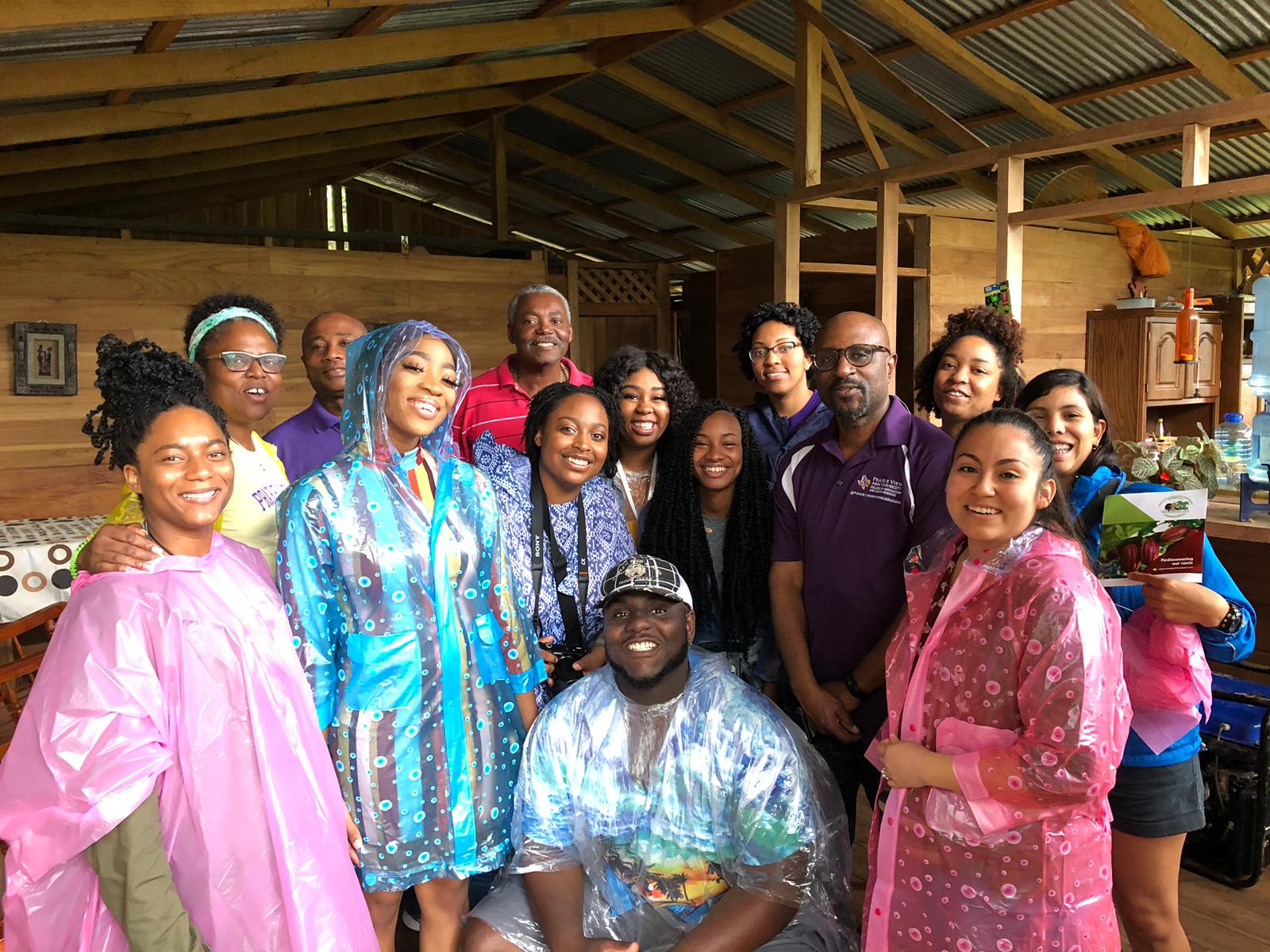May 20 – Travel and new experiences are a grand part of a student’s college experience. The College of Agriculture and Human Sciences ensured such an opportunity for students who spent their spring break studying agriculture in Costa Rica.
Under the leadership of Research Scientist Dr. Noel Estwick, nine students embarked on a week-long journey, from March 10th to 16th, to explore Costa Rican culture and be exposed to the agricultural practices of Costa Ricans of African-descent. Students were engulfed in rich culture and new experiences each day of their stay. To many, Costa Rica is known to have inhabitants of Spanish-descent, but there are also those of African-descent and that is what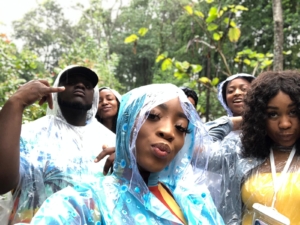 much of the experience focused on. Keeping in mind that most Afro-Costa Ricans live in the Límon Province, Estwick developed the program based on that in order familiarize students with these underrepresented populations. The region is known to produce cacao, bananas, and plantains. Accompanying Estwick’s lead for the course was Associate Dean for Academic Programs and Department, Head Dr. Kwaku Addo, and Mrs. Colleen Harris of the PVAMU Office of International Affairs. This program is partnered with the Fabio Baudrit Agricultural Experiment Station at Universidad de Costa Rica where Dr. Renan Aguero is the Director. With the study abroad trip being tied into a CAHS course, each day presented an educational aspect on which students were given exams on and presented final projects.
much of the experience focused on. Keeping in mind that most Afro-Costa Ricans live in the Límon Province, Estwick developed the program based on that in order familiarize students with these underrepresented populations. The region is known to produce cacao, bananas, and plantains. Accompanying Estwick’s lead for the course was Associate Dean for Academic Programs and Department, Head Dr. Kwaku Addo, and Mrs. Colleen Harris of the PVAMU Office of International Affairs. This program is partnered with the Fabio Baudrit Agricultural Experiment Station at Universidad de Costa Rica where Dr. Renan Aguero is the Director. With the study abroad trip being tied into a CAHS course, each day presented an educational aspect on which students were given exams on and presented final projects.
On the group’s first full day of activities, students visited a cacao farm and reservation. They gained great insight from farmer Edgar Campbell who is part of a cooperative group of cacao farmers of African descent in Costa Rica called COOPECACAO AFRO. He has made it his mission to keep Afro-farmers relevant in that region and revive the cacao production with the help of other local farmers. Senior Agriculture major Anthony Brown was amazed at the way Costa Rican’s interact with their weather conditions and how the agriculture thrives in such a tropical country in addition to the many foods that were produced year-round. 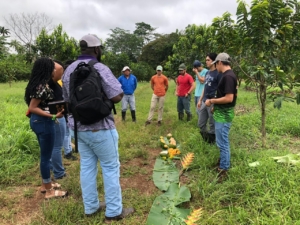 “We learned how the producers of cacao utilized all there resources on their farms to help plants and the environment around them and not wasting anything. We also learned how they produced the cocoa, and what all goes into making chocolate.” The students were all truly inspired by Campbell’s passion and efforts to continue a longstanding agricultural tradition in Costa Rica.
“We learned how the producers of cacao utilized all there resources on their farms to help plants and the environment around them and not wasting anything. We also learned how they produced the cocoa, and what all goes into making chocolate.” The students were all truly inspired by Campbell’s passion and efforts to continue a longstanding agricultural tradition in Costa Rica.
Their next few days consisted of cultural experiences when they met and interacted with the indigenous people of the Bribri tribe. Meeting the Bribri taught students the tribe’s traditions and uses of medicinal plants, their ingenuity with items found in nature, and how to make chocolate from scratch, a practice reserved only for the women of the tribe due to the traditional matriarch hierarchy standard of the culture. Students also experienced foods they hadn’t before such as yucca, and were able to see the two remaining banana trees from a species that is going extinct. The group also spent time at the Puerto Viejo Jaguar Rescue Center where they saw animals, such as sloths, that play a vital role in the agriculture throughout Costa Rica. To close out this experience, the group enjoyed fresh coconut water and had a swim at a popular local waterfall to relax and reflect.
The last two working days of the study abroad trip was spent at EARTH University, an agricultural college that focuses on educational tourism. The institution, which welcomes students from across the world, prides itself on providing a hands-on learning curriculum with all instruction being given in Spanish and in the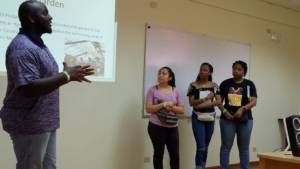 field. Estwick shares that admitted students spend four months with a host family so get immersed in Spanish before coming to the classroom. PVAMU and EARTH students worked closely for those two days and collaborated on their final projects. Estwick notes, “The agricultural operations
field. Estwick shares that admitted students spend four months with a host family so get immersed in Spanish before coming to the classroom. PVAMU and EARTH students worked closely for those two days and collaborated on their final projects. Estwick notes, “The agricultural operations
Seven of the nine students received full or partial scholarships to cover their study abroad trip and were able to express their gratitude once back on campus when students shared their experience at the weekly CAHS Research Seminar Series. Estwick hopes to be on the forefront of changing the experience for agriculture students at PVAMU as he notes the students witnessed the dynamic of learning between PVAMU and being in Costa Rica. “The major observation from the students is that our resources [at PVAMU] are underutilized. The students feel like they do not get enough hands-on opportunities here.”
Student participants included: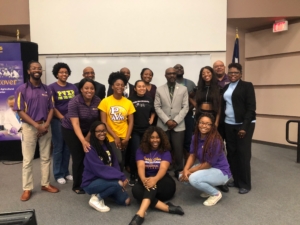
- Anthony Brown
- Asia Phillips
- Camryn Davis
- Dora Marin
- Khadyaja Jenkins
- Marissa Gray
- Marleigha McGinty
- Tamia Hull-Littlejohn
- Victoria Johnson
Agriculture is practiced in various forms across the globe and for these students to witness this from a culture different from their own proves the impact that CAHS is making. This spring break was like no other for them and everything that they were able to encounter in such a short amount of time will forever impact their way of life, and how they apply their knowledge in agriculture from this point on.

Taelor Smith
Communications Specialist
tasmith@pvamu.edu
(936) 261-5155

